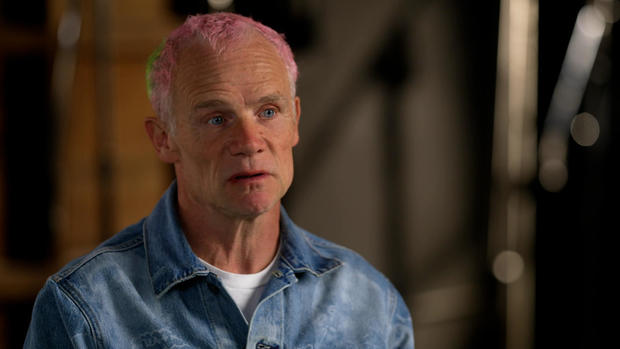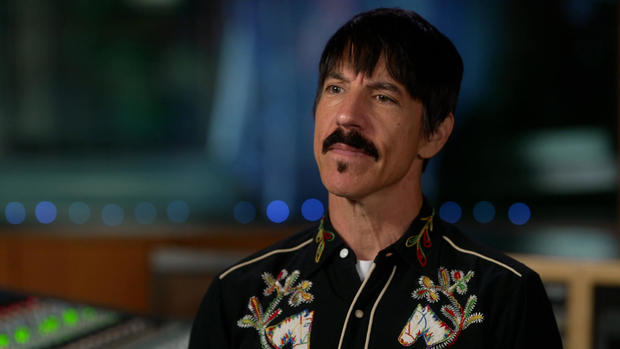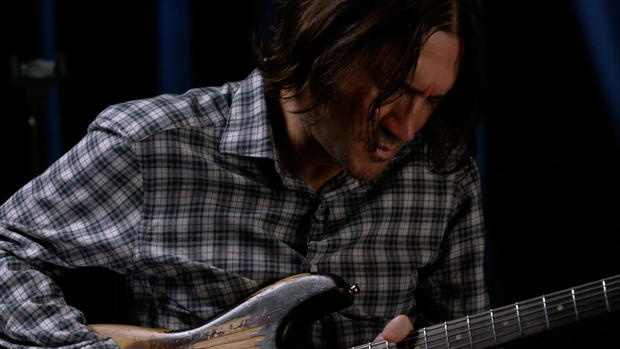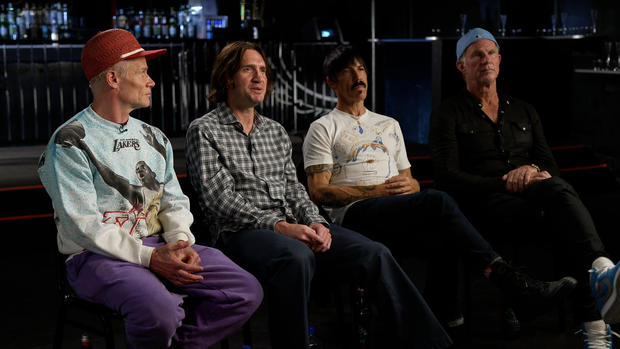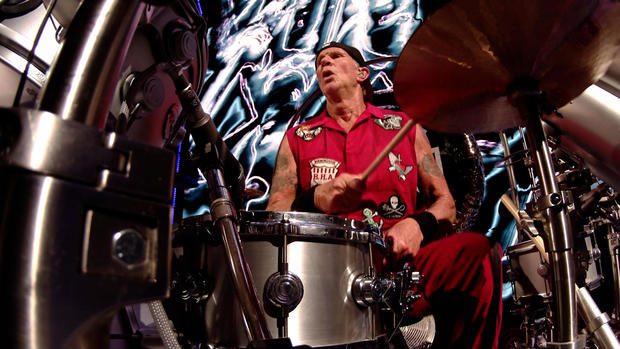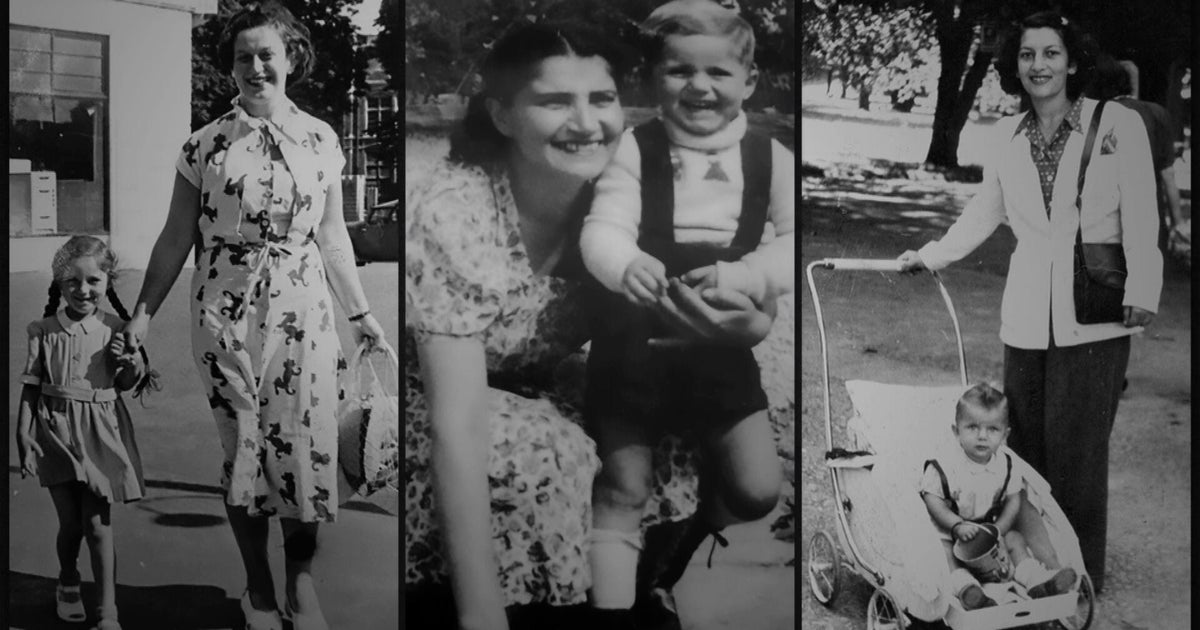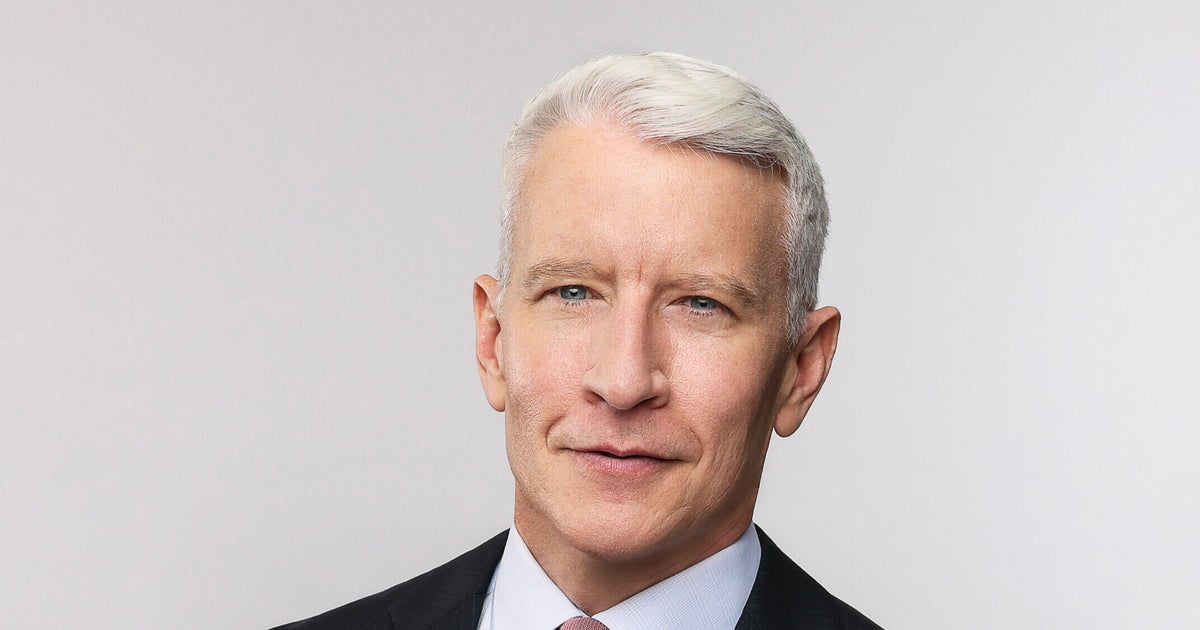The Red Hot Chili Peppers on 40 years of music
Rock bands are sensitive instruments. Creative tensions, clashing egos, the grind of touring—none of it screams stability. Add drugs, death and demons and you have a breakup (or a breakdown) waiting to happen. How then to explain the durability of the Red Hot Chili Peppers? They started in the 80s, swiveling among genres —funk, punk, rock, rap — an underground L.A. band until they broke through. As we first showed you last February, 40 years on, they persist selling out stadiums worldwide; rocking and relevant for far longer than anyone would possibly have predicted—not least themselves.
The Red Hot Chili Peppers warned us: the stage is no place for boundaries. All intensity and improvisation and happy chaos, they are as much a band for the eye as for the ear. We saw them in Nashville and at the Austin City Limits Festival, the last stop of their most successful year of touring ever: north of $200 million gross–as remarkable a fact as this: a founding member was celebrating a milestone: a 60th one …
Jon Wertheim: Happy Birthday!
Flea: Thank you so much!
Jon Wertheim: You're gonna go out there, there are gonna be 80,000 people that are gonna know every word.
Flea: Yeah
Jon Wertheim: Can you wrap your brain around that after all these years?
Flea: I kind feel like the phenomenon of our band and this is the thing I do – I do find kind of inexplicable is that every time we make a new record and we go out and do a tour, and I look out into the audience, as far as I can see are, like acne-faced teenagers losing their f***ing minds.
That's Michael Balzary, known universally, of course, as Flea. He plays bass in the quartet that includes drummer Chad Smith, age 61, guitarist John Frusciante, 53, and lead singer Anthony Kiedis, 60—born within a few weeks of Flea.
In L.A., we met them at the Roxy on the Sunset Strip, one of their early haunts, where they told us: just as they connect with audiences; they connect with each other.
Flea: Like, like the way jazz players play and the way that basketball players play, just like, telepathically, and understanding when to go, and when to move, and when to do what.
John Frusciante: We're all supporting each other at the same time. It's-- it's-- everybody has different ways of doing that, you know? I see the bass as the lead instrument the whole time. Flea doesn't see it that way.
Jon Wertheim: You see him as the lead instrument?
John Frusciante: Oh, yeah. Yeah, I see each song as being, like, a bass solo where (LAUGH) I'm-- I'm there to-- I'm there to support it.
To understand their enduring appeal, start by listening to their four-decade-long list of bangers, that cut a ridiculously wide musical swath. But that's only a partial explanation. It's also the torrential talent. Frusciante is widely considered to rank among rock's greatest guitar heroes, Chad Smith is regarded as one of today's great drummers, Flea's name is synonymous with virtuosity on the bass. Within their psychedelic circus—and this might be a band's secret superpower—there's no clear ringleader.
Jon Wertheim: What do you call yourself?
Anthony Kiedis: What do-- I don't call myself anything, really. I call myself a band member. On a good day, a musician, songwriter.
Jon Wertheim: Do you buy front man?
Anthony Kiedis: The Red Hot Chili Peppers have three front men, and-- and we always have and we have a front man in the back. Mr. Chad Smith.
Jon Wertheim: I'm really struck by the physicality of what you're doin'?
Anthony Kiedis: We value so much the ability to go rock out onstage for two hours. Nobody wants to lose that.
Jon Wertheim: So, what happens to you on stage? Describe it from your perspective.
Flea: It's a sacred time for me. So, when I get on stage, like, no matter what, I'm gonna give everything I can. I wanna articulate-- all those feelings physically. I wanna honor the great entertainers that came before. I wanna honor Frank Sinatra and Iggy Pop and Jimi Hendrix and the Xavier Cugat Orchestra, you know what I mean, like--
Jon Wertheim: The real lineage of--
Flea: And-- and John Coltrane.
Jon Wertheim: You see yourself on this continuum?
Flea: I do. And I think having that vision is-- a big part of why the Chili Peppers have managed to maintain for so many years and for us to-- at least to ourselves, we still feel relevant and vibrant.
Still based in greater Los Angeles —it's the city they live in, the city of angels—they're not just from the area, but of it. Kiedis is a local fixture on his motorcycle; Flea, at Laker games and in his retro ride.
Jon Wertheim: This is your town?
Flea: Yea, look, I'm an LA boy. All my life. I know this town inside out. Every little crack and every sidewalk.
Their story begins on the pavement of Hollywood. Not palm-lined movie star Hollywood, but the seedy one from the 70s. Flea spent his early years in New York before heading west with his mom. Anthony Kiedis was a transplant from Michigan, living with his father. Neither, critically, had brothers. Long before they were bandmates, Kiedis and Flea were best mates at Fairfax High.
Jon Wertheim: What was the friendship born of?
Anthony Kiedis: We both came from broken homes, slightly-- atypical homes, non-conventional homes. And really, we wanted to get in trouble. Like, how much trouble can we get in without going to jail?
Flea: We were just little street urchin, petty thievin', runnin' around in the street, tryin' so hard, yearning so much to figure it out like how can we matter? My relationship with Anthony is a profound thing for me. I 'member that; my mom tellin' me. She goes "Michael--"You came home and-- you said, 'I-- Mom, I met somebody that I've never been able to talk to like that before.'" You know? Someone I could really talk to and that I felt heard by.
Flea and Kiedis found kinship with two other outcast classmates: Hillel Slovak, a guitar player, and Jack Irons, a drummer. While his friends were working on their musicianship, Kiedis first tried to make it as an actor and—fun fact— shows up in an after-school special. But eventually, Kiedis joined his friends in a band. In the beginning, he wasn't even singing; he was rapping.
Anthony Kiedis: A lot of it had to do with-- with-- hip-hop and Grandmaster Flash. Like I never saw myself as a wildly melodic person. But at that moment, I was like, "Oh, you can just tell a story and-- and be in a band. You don't have to necessarily be Al Green and be in a band." So that was my ticket to think, "I-- I could do this."
They called themselves the Red Hot Chili Peppers, a nod to early 20th century jazz bands. Within a year, they had a record contract. From the beginning, they went full throttle—all gas, no brake.
Anthony Kiedis: We had a lot of musical influences from hardcore, bee-bop jazz, to crazy progressive rock to hip hop but we also had the Three Stooges, we also had the Marx Brothers, we also had Richard Pryor, and Redd Foxx. You know comedy, and being ridiculous.
Jon Wertheim: Meld those together--
Anthony Kiedis: Meld 'em.
Jon Wertheim: What does that leave you with?
Anthony Kiedis: A make-it-or-break-it bunch of boys that were willing to risk everything to have fun in the moment.
At the same time, they've always taken the work seriously.
Jon Wertheim: How do you guys write and construct songs? How's this work?
Anthony Kiedis: John and Flea are the most kind of prepared and come in with, "I've got these ideas."
John Frusciante: Flea and I used to do face-offs quite a bit.
Jon Wertheim: What's a face-off?
John Frusciante: We need a section. We've got a verse, say, and we need a chorus. In the old days we would start it out by going like that to each other and give each other a dirty look. And then we'd go into other rooms. Then we come in and each guy plays his section for the other guys.
Flea: We could either go home and, like, think of it at home, or we can do it right then.
Flea: We're gonna do a face-off right now, the part's gonna get done.
Anthony Kiedis: Can I tell you what I love about the face-off? It's-- an unexpected moment of humility. They put their ideas on the line. And-- and whatever is the best for the song, no one cares.
Jon Wertheim: How do you hit that balance between the commitment to the craft and also the ridiculousness you're proud of?
Flea: We just are all those things--We're just being ourselves. Like, we're disciplined. We work hard. We're silly. We're funny.
Chad Smith: We're entertainers. We're entertainers.
Like all entertainers, they have to work at maintaining their peaks. They practice. They generate. They stay in shape. Chad Smith replaced Jack Irons in 1988.
He joked with us that the band used to have groupies; now they have tech support and physical trainers.
Jon Wertheim: How is your body holdin' up at this point?
Chad Smith: It's holdin' pretty good for an old gentleman. I want to make sure that my guys know that, He's back there. The engine is runnin' like a well-tuned machine. And it gives them a lot of confidence, and th-- they can just paint-- like the drum kit's kind of like th-- the canvas. And they get to paint on top of it.
John Frusciante plays perpetually and prefers to warm up for four hours the day of concerts.
Flea, a converted, accomplished, jazz-trained trumpet player, is constantly innovating on the bass, as he showed us at his malibu home studio.
Flea: So there's plucking like this which is, like, walking between two different fingers.
Flea: And then thumping and popping is (BASS) I hit my thumb and pop it.
Flea: I did this so much and so aggressively that this callus on my thumb would split open, and I'd just have this gash, open wound in my thumb. And I-- and I figured out how to fix it by pouring super glue in there.
The band has also confronted the kind of physical challenges that cannot be so easily hacked—not least, sobriety. Hillel Slovak, the original guitarist, died of a heroin overdose in 1988.
His eventual replacement, Frusciante, has been open about his deep descent into hard drugs, particularly heroin. He has left the band twice, before returning.
As for Anthony Kiedis, he told us he works at staving off his various addictions. The cliche: sex, drugs and rock-and-roll? He hit that trifecta hard, which he discussed with bracing openness in his 2004 memoir.
Jon Wertheim: Just as music changes, so do cultural norms. When you look back at some of the antics and behavior from the-- the '70s and '80s in particular, and women in particular, that wouldn't fly today. How do you process that?
Anthony Kiedis: Wow. I feel like I was who I was when I was that person I wouldn't blame it on a era, or a cultural landscape, or a difference in the way society views people. It's like, if I did something stupid then it would be stupid today, and vice versa. Hopefully I've made those amends along the way.
Therein may lie another secret to the band's longevity. Just as bad is bad, good is good—era be damned, the Red Hot Chili Peppers have evolved—without concessions. Not just playing their instruments, but still attacking them, they've survived—sometimes in spite of themselves. No coda in earshot; no end in sight.
Jon Wertheim: You're not just trottin' out the hits from 20, 30 years ago, this is-- a vital, vibrant, creating enterprise.
Flea: Yeah, It takes diligence. It takes sacrifice. We work. We write. We never stop. This is our purpose. Like, we're humble. We're students. We care. We wanna grow. We wanna learn.
Jon Wertheim: Not every artist feels that.
Flea: Every good one does.
Produced by John Hamlin and Kara Vaccaro. Broadcast associate, Elizabeth Germino. Edited by Peter M. Berman and Aisha Crespo.

